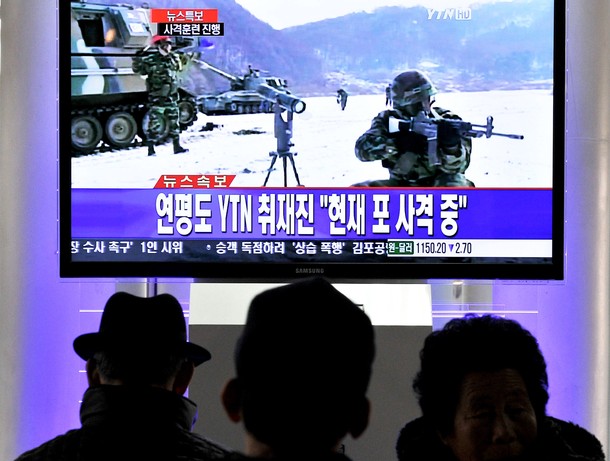
The current crisis between the Koreas is now over a month old, with the North and South Koreans gnashing their rhetorical teeth and one another and the world wondering if this could be the onset of a second Korean War. The current flap began last month over the shelling of Yeonpyeong Island, a part of South Korea only seven miles off the North Korean coast, by the Democratic Republic of Korea (DPRK, or North Korea). Recriminations flew back and forth between the two sides and came to focus on South Korean atrillery exercises scheduled for this month off the island–an activity that the DPRK argued was provocative and could lead to renewed hostilities. These pronouncements were met in kind by the Republic of Korea (ROK or South Korea). Where will it all go?
The whole episode has taken place in a familiar atmosphere in which common elements to other crises between the DPRK and ROK have worked themselves out. Three elements, two familiar from the past and one a recurring wraith that hangs over relations, stand out.
The first, and most obvious, source of tension and concern is the wraith of the DPRK nuclear arsenal. Without going into detail, North Korea is now generally acknowledged to be the world’s ninth nuclear power, with probably 6-8 nuclear weapons deliverable over moderate ranges that certainly include most of Soth Korea and probably Japan as well. The DPRK has alternately announced intself as a nuclear power, than backed away from the designation only to reassert it. The reasons the DPRK feels the need to keep a nuclear arsenal are numerous and include the prestige of having joined the nuclear club and thus the status it provides to a regime and country that would be highly inconsequential without them. The North Koreans were almost certainly motivated by the fact that they faced a nuclear-armed United States across the 38th Parallel (the de facto boundary between the Koreas) when they decided to launch a nuclear program in the 1950s, and the deterrence of attacks against them equally certainly underlays their commitment to being a nuclear power.
Regardless of why North Korea has gone nuclear, their possession has at least two important consequences. One is that it raises the deadly calculus of war on the peninsula. Almost all observers agree that the DPRK would lose such a war and that one of the consequences would be the overthrow of the regime and the probable reunification of the country under South Korean control. These outcomes are, hopefully, well enough known and unpalatable enough to keep the DPRK from starting a war in the first place, but should they launch such a war anyway, these dynamics might well lead to a decision to use their nuclear arsenal as a last-ditch, desperation way to avoid defeat. Such an action would equally likely result in a nuclear strike against them, and the Korean peninsula would be the sure loser. Second, the failure to convince the DPRK to back away from its nuclear program could lead other regional powers, notably the ROK and Japan, to conclude they must develop comensating capabilities, thereby initiating a nw nuclear arms race.
There are also two familiar dynamics at work here that have been present in past crises. One is a succession process in the DPRK. Thecurrent leader, Kim Jung-Il, is known to be in failing health, and following the lead of his father (Kim Il-Sung, the original DPRK leader), he has designated a son to take his place. Until his elevation, Kim Jong-Un was virtually unknown prior to his designation, and the twenty-six-year-old was quickly appointed as the world’s youngest four-star general this fall. Covering the succession process with a crisis was also done when the current leader was annointed. Third, North Korea is apparently undergoing one of its periodic, chronic food crises, and it has been the case before that the DPRK has precipitated crises as a way to extract needed aid from the outside world rather than having openly to beg for them.
Thus, the current crisis has a slightly familiar ring. The North Koreans provoke, the South Koreans rise to the bait and issue counter-threats, the world holds its breath and intervenes (currently through the “unofficial” Bill Richardson mission–with CNN’s Wolf Blitzer along for the ride). The news today suggests that the ritual kabuki is going according to script: the South Koreans have delayed their artillery exercise, with bad weatheras the excuse; and the North Koreans have suggested to Richardson they might let American forensic personnel into the DPRK to examine recently discovered remains of fallen Americans from the Korean War.
The current crisis could deviate from the past script and degenerate into warfare that no one wants and which would benefit no one, but there is a hint of a familiar kabuki in the air. Let’s hope the participants don’t forget their roles and their lines, paticularly since the failure to do so could have particularly devastating consequences in a nuclear-armed Korean peninsula.
Donald M. Snow, Professor Emeritus at the University of Alabama, is the author of over 40 books on foreign policy, international relations, and national security topics. This essay first appeared at his blog What After Iraq? Photo credit: Getty Images.
Image: korea-kabuki.jpg
